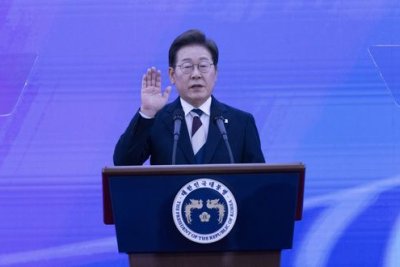
South Korean President Lee Jae-myung took office on Wednesday and promised to unify the country after months of political turmoil. Pool Photo by Jeon Heon-kyun/EPA-EFE/
SEOUL, June 4 (UPI) — Lee Jae-myung was sworn in as South Korea’s president on Wednesday, just hours after his victory was certified in a snap election that brought an end to months of political turmoil in the country.
Lee’s term officially began at 6:21 a.m. when the National Election Commission certified his victory over challenger Kim Moon-soo of the conservative People Power Party.
The new president received 49.42% of the vote, while Kim garnered 41.15%, the NEC confirmed. Minor conservative Reform Party candidate Lee Jun-seok finished with 8.34%.
In a speech during a scaled-down ceremony at the National Assembly, Lee pledged to unify a country that saw its political divisions grow deeper in the aftermath of former President Yoon Suk Yeol’s botched martial law attempt in December.
“Regardless of who you supported in this presidential election, I will become a president of all who embraces and serves all the people,” Lee said.
During his campaign, Lee framed the election as an existential choice for the future of South Korean democracy, and he echoed that theme in his remarks.
“I will become a president who ends the politics of division,” he said. “I will overcome the crisis by using national unity as my driving force. I will restore what was lost and destroyed by the insurrection.”
South Korea “has become a clear example for people around the world who are looking for a new way forward for democracy in crisis,” he added.
Lee inherits a raft of challenges as president, with economic concerns at the top of the list. South Korea saw its economy shrink in the first quarter of the year, and the export-driven country is facing tariff negotiations with U.S. President Donald Trump, who doubled tariffs on steel and aluminum to 50% on Wednesday.
In his remarks, Lee said the election was a “turning point of great change” and vowed to stimulate economic growth.
“It is time to revive the people’s livelihoods that have been driven to the brink, restore growth and create a tomorrow where everyone is happy,” he said.
Lee, who rose to fame as a progressive firebrand during his tenure as mayor of Seongam and then governor of Gyeonggi Province, recast himself as a centrist during the campaign.
On Wednesday, Lee said his administration “will be a pragmatic market-oriented government.” He reiterated campaign pledges to invest heavily in science and technology, with a heavy focus on developing one of the world’s top artificial intelligence industries.
Lee also vowed to take a pragmatic approach toward healing the country’s deep political divides.
“Let’s send old ideologies to the museum of history,” he said. “From now on, there will be no problems for progressives. From now on, there will be no problems for conservatives. There will only be problems of the people and of the Republic of Korea.”
The 60-year-old briefly touched on pressing geopolitical concerns during his remarks, including an increasingly dangerous nuclear-armed North Korea.
Lee said he would continue to strengthen cooperation with the United States and Japan — a trilateral alliance that Yoon championed — but said Seoul would “approach relations with neighboring countries from the perspective of national interests and practicality.”
While Yoon and the PPP’s Kim took a hardline approach toward Pyongyang, Lee pledged during his campaign to reopen communications with Seoul’s recalcitrant neighbor.
“We will prepare for North Korea’s nuclear weapons and military provocations, while opening channels of communication with North Korea and establishing peace on the Korean Peninsula through dialogue and cooperation,” Lee said.
U.S. Secretary of State Marco Rubio congratulated Lee on his election victory Wednesday and affirmed the strong ties between the allies.
“The United States and the Republic of Korea share an ironclad commitment to the alliance grounded in our Mutual Defense Treaty, shared values and deep economic ties,” Rubio said in a statement.
“We will also continue to deepen U.S.-Japan-ROK trilateral cooperation to bolster regional security, enhance economic resilience and defend our shared democratic principles,” he said.
Lee began assembling his cabinet on Wednesday, nominating one of his top campaign aides, Democratic Party Rep. Kim Min-seok, as his candidate for prime minister. He also tapped former Unification Minister Lee Jong-seok to head the National Intelligence Service, the nation’s top spy agency.
Both nominees must undergo confirmation hearings. Lee’s chief of staff will be Democratic Party Rep. Kang Hoon-sik.